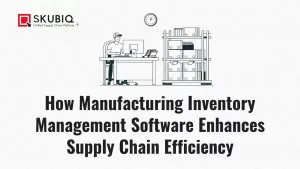In the pharmaceutical industry, managing inventory efficiently is crucial for maintaining compliance, minimizing costs, and ensuring the availability of medications. Warehouse Management Systems (WMS) software has emerged as a transformative tool that streamlines these processes. In this article, we will explore the multifaceted benefits of implementing WMS software in the pharmaceutical sector, focusing on how it can optimize inventory management and enhance operational efficiency.
Understanding the Role of WMS in Pharmaceutical Inventory Management
A Warehouse Management System is an automated solution that assists in managing inventory levels, stock locations, and the overall flow of goods within a warehouse. For pharmaceutical companies, the stakes are particularly high. The need for compliance with regulatory standards, the importance of precise tracking, and the critical nature of timely deliveries make WMS software an indispensable asset.
1. Enhanced Accuracy in Inventory Tracking
One of the primary benefits of utilizing WMS software is the significant increase in inventory accuracy. Traditional inventory management methods often lead to errors due to manual data entry, mislabeling, or misplacement of stock. WMS software minimizes these risks through:
- Real-Time Tracking: Utilizing barcode scanning and RFID technology, WMS allows for real-time visibility of inventory levels, reducing discrepancies between physical and recorded stock.
- Automated Reporting: Generating reports on stock levels, expiration dates, and order histories enables pharmaceutical companies to maintain accurate records, crucial for regulatory compliance.
2. Improved Compliance and Traceability
In the pharmaceutical industry, compliance with regulatory standards such as FDA and DEA guidelines is non-negotiable. WMS software enhances compliance through:
- Batch and Lot Tracking: WMS facilitates detailed tracking of each batch or lot of pharmaceuticals, making it easier to identify the origin of products and comply with recall requirements.
- Automated Audit Trails: Every transaction is recorded, creating an audit trail that can be easily accessed during inspections or audits, thereby simplifying compliance management.
3. Efficient Space Utilization
Maximizing warehouse space is a significant challenge in the pharmaceutical industry, especially when dealing with numerous SKUs. WMS software optimizes space utilization through:
- Dynamic Slotting: The system analyzes sales trends and adjusts the placement of products within the warehouse, ensuring that high-demand items are easily accessible.
- Inventory Categorization: By categorizing products based on criteria such as size, weight, and frequency of use, WMS enhances the organization of the warehouse and maximizes storage efficiency.
4. Streamlined Order Fulfillment Processes
In a highly competitive market, efficient order fulfillment can be the difference between retaining a customer and losing them to a competitor. WMS software improves this process through:
- Automated Order Picking: Utilizing picking algorithms, WMS can determine the most efficient picking routes, reducing the time spent on order fulfillment.
- Real-Time Inventory Updates: As orders are processed, inventory levels are automatically updated, ensuring that stock information is always accurate and preventing overselling.
5. Cost Reduction
Implementing WMS software leads to substantial cost savings in various areas, such as:
- Reduced Labor Costs: Automation reduces the need for manual labor in inventory management, thereby lowering payroll expenses.
- Minimized Stockouts and Overstock: With accurate inventory data, companies can better manage stock levels, reducing instances of stockouts that lead to lost sales and overstock situations that tie up capital.
6. Enhanced Customer Satisfaction
A reliable inventory management system directly impacts customer satisfaction. By ensuring that medications are available when needed and orders are fulfilled accurately and promptly, pharmaceutical companies can enhance their service levels:
- Faster Response Times: WMS enables quicker processing of orders, which translates to faster delivery times.
- Improved Communication: Customers benefit from accurate order tracking and inventory availability information, leading to a more positive experience.
7. Integration with Other Systems
A robust WMS does not operate in isolation. It can integrate seamlessly with other business systems such as Enterprise Resource Planning (ERP) and Customer Relationship Management (CRM) software, creating a cohesive operational framework:
- Holistic Data Management: By integrating WMS with ERP, companies can ensure that all aspects of inventory management are aligned with broader business objectives.
- Enhanced Decision-Making: Access to integrated data allows for informed decision-making regarding purchasing, production, and distribution.
8. Scalability and Flexibility
As pharmaceutical companies grow, their inventory management needs evolve. WMS software is inherently scalable, allowing organizations to adjust their systems to accommodate increased inventory levels or additional warehouses:
- Modular Solutions: Many WMS solutions offer modular capabilities, enabling companies to add features as their needs change without overhauling their entire system.
- Adaptability to Market Changes: With the ability to quickly adapt to changes in demand, WMS helps pharmaceutical companies stay competitive and responsive.
Conclusion
In summary, the implementation of WMS software in the pharmaceutical industry offers a wealth of benefits, from enhanced accuracy and compliance to cost reduction and improved customer satisfaction. By optimizing inventory management processes, pharmaceutical companies can not only ensure regulatory compliance but also maintain a competitive edge in a rapidly evolving market. Embracing WMS technology is not just a strategic move—it’s a necessity for modern pharmaceutical operations.



